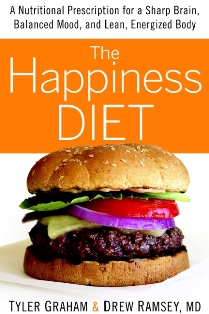Most people don’t realize that our foods affect our brain as well as our emotions. When we eat healthy foods that are good for our brain, our brain health would be healthy and working effectively, preventing us from brain illnesses and diseases like ADHD, dementia and many more.
 Today, we have invited Dr Drew Ramsey to share with us his book on The Happiness Diet. Drew Ramsey, MD, Assistant Clinical Professor of Psychiatry, Columbia University
Today, we have invited Dr Drew Ramsey to share with us his book on The Happiness Diet. Drew Ramsey, MD, Assistant Clinical Professor of Psychiatry, Columbia University
1. What encouraged you to write The Happiness Diet?
I wanted to share the latest science and good news about the impact of food choices on brain health. As a physician, it is very clear to me that better food choices allow people to build healthier, happier brains. There is an epidemic of brain health problems today – depression, ADHD, dementia – that is growing and not enough attention is being paid to food. Speaking with patients about food, I saw this as a powerful and underutilized tool— a side effect free, tasty way to feel happier all while losing weight. With just a few simple changes to your diet, food can be a medicine that everyone takes at least three times a day
There are a lot of books on losing weight, and people certainly lose weight on The Happiness Diet, but a real key to losing weight is feeding your brain. The average American actually eats a diet that over time shrinks the brain. I hoped a diet book would help people understand how powerful their dietary choices can be and that the key to your feelings is at the end of your fork.
2. It is called the Happiness Diet – can you tell us why you chose this theme?
Losing weight is a great goal, but we all want to be happy. People are often surprised to learn about the depth of the science that connects mood, mental clarity, energy and food choices. As I work with people to improve their lives it is clear that you need stable moods, mental focus, and a lean energized body to have your best shot at happiness. These are also the concerns I hear from people every day – they feel moody, foggy, and tired. As I reviewed the vast amount of research that supports the book, it became clear that America needed a nutritional prescription.
3. Tell us about the “mood-destroying” foods in the average American diet.
The Modern American Diet or MAD consists of too much sugar and refined carbohydrates – this is mood buster #1 for most Americans – along with the wrong fats and a host of new molecules bad for the brain and body like pesticides and chemicals like BPA that leach from food packaging. The average American eats 52 teaspoons of sugar a day, a 3000% increase over the last few hundred years. Eating this much sugar over time leads to obesity, diabetes, and brain dysfunction.
The majority of calories for average American comes from “added sugars” and “added fats”. The sugars are ingredients like corn syrups solids, crystalline fructose, high-fructose corn syrup and also from refined carbohydrates – after all white flour is primarily a simple sugar, glucose. The added fats are things like corn, sunflower, and soybean oils which contain more pro-inflammatory fats called omega-6s. They are linked to an increased risk of depression and also seem to negatively influence the way our bodies process sugar. Another big shift in our diets over the past 100 years was the addition of industrial trans-fats into the food supply. Many people have heard the link of trans fats to heart disease, and just last year they were also clearly linked to depression.
On top of all this sugar and fats are a host of new chemicals to flavor, color, preserve, and package processed foods. No one is arguing that any of this stuff is good for the brain, and there is an increasing body of evidence that many of these compounds are bad for the brain.
4. What are the worst trends you see in the average American diet.
Maybe I’m an optimist, but I actually see a lot of Americans making better choices. I am really excited by the ground swell of interest around food and farms– more famer’s markets (more farmers!), more organic local food, and more people who care about where and how their food is produced.
Three recent trends concern me – medicating a bad diet, poor sleep, and inactivity with energy drinks and hi calorie coffee drinks; the rise in fructose as a sweetener; and people’s impression that vegan diets are healthy. Additionally, people continue to seek out low-fat foods and yo-yo on extreme diets or cleanses.
5. What differentiates “The Happiness Diet” from a number of weight loss diets in the market?
It tastes better! Weight loss will be sustained. You won’t be hungry or irritable on The Happiness Diet. You’ll feel great because you know you are feeding your brain while losing weight. And you will worry less as there are no preservatives, additives, fake ingredients,trans-fats, or chemicals like BPA. There isn’t a gimmick or single super food – people like the diet because it appeals to common sense – real, whole, unprocessed foods are the foundation of feeling your best.
Another key difference is the amount of science that backs up The Happiness Diet – over 300 studies are cited in the book. Lastly, the book examines the history of how our diets have changed over the last few hundred years. The combo of the latest science, an examination of how the MAD was created, and then straight-forward tips on shopping and preparing food sets the book apart.
6. Could you share with us on average how much weight does your clients usually lose while following the happiness diet? And what is the ONE thing that helps them to lose weight with “The Happiness Diet”?
Almost everyone loses 15-20 pounds. A reader recently wrote in who lost 26 bounds in just 6 weeks. I’m also hearing from several men who like the diet because it isn’t a “diet” and have lost 15 without ever being hungry.
The factor that I believe helps people is that their mood is great. Optimism and positive feelings , unlike irritability and feeling low, don’t get medicated with bad food choices – ie there is less “emotional eating”.This improved mood helps people keep making better choices at every meal to forgo simple sugar, refined carbs and highly processed foods. People are motivated to do that because the book increased their knowledge about the current science on nutrition and also the diet tastes great and is full of foods people know and like.
7. What should a person expect to experience while following this diet? Could you share some of the experiences that your clients have gone through with the diet?
An early change is fewer mood swings. Another people describe is no gnawing hunger that they have experienced on other diets. Over a few weeks people notice more energy and they feel a bit sharper. For someone with no meat in their diet living on high carb foods, or a lot of sugar (or another I see a lot is no seafood) the effect is very dramatic. The great thing is that the gains continue. Eating for brain health and happiness pays benefits for the decades to come.
An added benefit of The Happiness Diet is you understand how real food feeds your brain. Instead of just thinking excess sugar is bad, you’ll know the details of how excess sugar is bad for the brain.
8. As a health expert, which foods, if any, do you simply refuse to eat due to their negative health impact?
I never eat packaged food, like pre-packaged pastries, and factory farmed deli meat. I love to snack, but I’ve swapped out all the junk snack foods for brain healthy alternatives like grape tomatoes with goat cheese, organic celery with almond butter, or a handful of almonds an walnuts.
9. Do you have anything specific or advice that you want to say to the readers who are struggling to lose weight to help them shed the fats?
Feed your brain and the rest will follow. Examine how your moods are driving your eating and start counting brain nutrients in addition to calories. Re-examine your notions about meat and fat – this is a cornerstone of eating for happiness. Most Americans are trying to lose weight based on old science focusing only on calories. Fat is your friend when it comes to weight loss and brain health. Lastly, cut out sugar and refined carbs and replace them with complex carbs, happy fats, and happy meats.

Leave a Reply